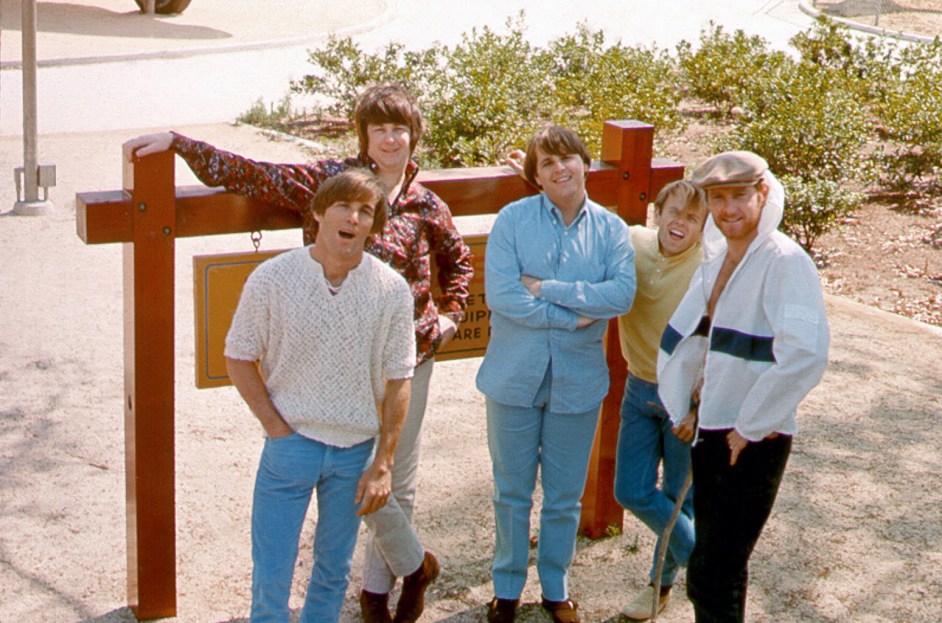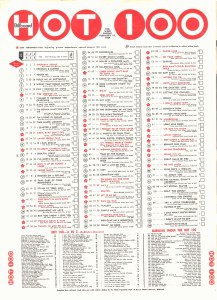
Dennis Wilson, Brian Wilson, Carl Wilson, Al Jardine and Mike Love of The Beach Boys in 1965 in Los Angeles.
Michael Ochs Archives/Getty Images
At his peak, Brian Wilson — who died this week at age 82 — went through periods the way a painter does. First, he made his family-and-friends act The Beach Boys a band for all seasons (but one in particular) with a handful of iconic West Coast classics of the beach and the open road. Then, he vertically expanded the possibilities of pop music with soaring pocket symphonies that captured the yearning, confusion and overall emotional overflow of youth with a somewhat frightening clarity. And then he ventured into the unknown, sprawling out with studio works so ambitious even he couldn’t quite get his arms totally around them, but which still achieved the sublime in their disarray.
Any one of these periods would’ve been enough to ensure Brian Wilson’s place in rock history, but the combination of them guarantees him and his Beach Boys catalog absolute immortality, the kind that in 200 years might have him known simply as “Wilson,” the way we refer to Monet or Van Gogh today. Generations raised on the Beach Boys have since raised additional generations of their own on the Beach Boys, to the point where their signature songs are now so entrenched in our DNA that merely looking at a list of their song titles is enough to make you burst into tears at their associated feelings and memories, and at the possibility (and ultimately, the cost) of peak human artistic achievement.
Here is our staff’s list of the 20 most essential Beach Boys songs — a peerless collection of works that still only covers a wall or two in the larger museum of Brian Wilson’s life and times.
-
“Surfin’ U.S.A.” (Surfin’ U.S.A.,1963)
While they debuted a few months earlier with Surfin’ Safari, in October 1962, the Beach Boys truly arrived the following spring with their second album, Surfin’ U.S.A., and its title track, which became the band’s first of 15 Hot 100 top 10s. The concept is simple: What if Chuck Berry’s “Sweet Little Sixteen” – from which “Surfin’ U.S.A.” takes its basic structure – was about how much California and surfing rule? Mission accomplished, and then some. “Surfin’ U.S.A” became a key entry in the California sound that emerged in the early ’60s, and helped define the Golden State mythos that emerged in pop culture during the period. — ERIC RENNER BROWN
-
“You Still Believe in Me” (Pet Sounds, 1966)
These days, we’d probably call it toxic at best, a f–kboy anthem at worst: a guy thanking his girl for hanging around while he treats her like dirt and abdicates responsibility (“I can’t help how I act when you’re not here with me”). But the song is more remarkable for its inherent scumminess, Wilson demonstrating both in word and deed that he is fully unworthy of his lover’s faith — and then just absolutely doubling over in disbelief and humility at the miracle of her not giving up on him. When he admits “I… wanna cryyyyyyyy……” you don’t doubt for a second that he means it, likely because you’re already sobbing too. — ANDREW UNTEREBRGER
-
“Sail On, Sailor” (Holland, 1973)
One of the most beautiful Beach Boys compositions, the langorous, piano-driven “Sail On Sailor” is especially notable because the lead vocal is handled not by the Wilson brothers or Mike Love, but by Blondie Chaplin, who was only in the Beach Boys from 1972 to 1973 and only contributed to two album. However, he left an indelible mark on this swaying track, which peaked at No. 49 — and which Wilson stated he never liked. — MELINDA NEWMAN
-
“In My Room” (Surfer Girl, 1963)
Wilson’s room was a sanctuary, and this early classic features Brian harmonizing magically and somewhat heartbreakingly with brothers Carl and Dennis about the solitary peace he finds within its confines. The ballad, which reached No. 23, has a hushed restraint to it that only adds to the almost hymn-like reverence the “room” takes on. — M.N.
-
“Little Saint Nick” (The Beach Boys’ Christmas Album, 1963)
On paper, “Little Saint Nick” does not work: The Beach Boys, released in time for the holiday season in 1963, salutes Santa Claus by providing copious details about his sled, repeating the no-duh phrase “Christmas comes this time each year” and never really explaining the “little” part of the title. And yet, 60-plus years later, the song remains a December staple due to those snappy melodies and hummable falsetto lines scattered throughout; considering how the classic holiday singles endure on the Hot 100 each year, “Little Saint Nick” might end up as one of Wilson’s defining cultural contributions. — JASON LIPSHUTZ
-
“Help Me Rhonda” (The Beach Boys Today!, 1965)
After recording a laid-back version for their excellent 1965 LP The Beach Boys Today!, the Beach Boys recast “Rhonda” in a more energetic, Wall of Sound vein. The lyrics – a desperate plea to a woman to start up a romance just so a guy can get over the previous girl — show that Wilson was beginning to break out from his fun-in-the-sun mold, delving into more complex emotional themes and personal sadness. But with a sprightly guitar riff, a galloping rhythm and Al Jardine’s charming lead vocal, there was enough pure pop pleasure in this re-recording to send it sailing to No. 1 on the Hot 100. — J. Lynch
-
“Surf’s Up” (Surf’s Up, 1971)
If the title of 1971’s Surf’s Up made you think the album was a return to early-’60s sun-and-sand form, the album cover dissuaded you of the notion real quick: a desolate figure slumped over on a horse, amid a backdrop so dark and shadowy you can barely make out more than an outline. The title track captured the mood of the cover and filled in the shading, with lyrics alternately opaque and devastating, set to beautiful and temptestuous musical figures that felt like the swirl of an uncertain tide at night. “Surf’s up, mm-mm,” Wilson nods unconvincingly. The ’60s are over. — A.U.
-
“She Knows Me Too Well” (The Beach Boys Today!, 1965)
The proper wind-up for Pet Sounds, Brian Wilson detailing what a horrorshow he is in relationships — his jealousy, his hypocrisy, his unfair expectations — and concluding, “But she knows me so well/ That she can tell/ That I really love her.” He’s not absolving himself for his crappy behavior so much as he is acknowledging his relative lack of emotional intelligence, understanding that he’s not telling his girl anything she isn’t all too aware of. He sounds so awe-stricken, grateful and downright petrified by that realization — all echoed and reenforced by the rest of the Boys humming in harmonized I know that feel bro agreement — that it’s still kind of a beautiful love song despite it all. — A.U.
-
“Surfer Girl” (Surfer Girl, 1963)
The lead single and title track from the Beach Boys’ July 1963 album — their third studio LP released that year — is a swooning summer love slow dance, rendered in doo-wop. “Surfer Girl” was written, produced and sung by Wilson, who opines about the titular love interest standing on the shore and making his heart come all undone, with the crux of the song being its riptide of young adult urgency as he demands to know, “Do you love me, do you surfer girl?” It’s as hard to resist as the undertow. — KATIE BAIN
-
“Fun, Fun, Fun” (Shut Down Volume 2, 1964)
If you’re gonna put the word “fun” in a song title not once but thrice, you damn well better deliver on that promise — and this early Beach Boys hit is one of the most gleefully infectious expressions of youthful rule-breaking ever put to wax. The Chuck Berry-indebted guitar riff that opens “Fun, Fun, Fun” is the pop-rock equivalent of a shiny T-Bird tearing out of a parking lot, and the energetic rush of Love’s lead vocal keeps this T-bird in high gear as it races all around town on a sunny California day. The lyrics aren’t poetry, but they do exactly what they need to without a wasted word, spinning a concise slice-of-life tale of what the ideal day looked like for an American teen in the early ‘60s: hamburgers, loud radios, fast cars, flirting and pissing off the old man. — J. Lynch
-
“Wild Honey” (Wild Honey, 1967)
In 1967, every rock band and pop singer under the sun was getting weird, experimenting with studio techniques (many of which Wilson pioneered) and stretching pop-rock to its breaking point. The Beach Boys went the opposite direction, penning an album of Motown-flavored tunes with a doo-wop-flavored title track. While the woozy theremin provides an out-there touch, Carl Wilson’s up-all-night lead vocal, the clanging piano, the easy-going bongos and the sugar-sweet harmonies are enough to make this lesser-loved Hot 100 hit stick out after all these years. — J. Lynch
-
“I Just Wasn’t Made for These Times” (Pet Sounds, 1966)
Written by Brian Wilson and Tony Asher, “I Just Wasn’t Made For These Times” from Pet Sounds spoke to Wilson’s pain of feeling alone and like he was “too advanced for his time,” as he once put it. The music speaks to that same feeling of alienation with its Electro-Theremin solo, which is reportedly the first time the otherworldly instrument was used on a pop record. Since the song’s release in 1966, it’s become of Wilson’s most defining songs, as a musical genius often tortured by his own mind, and it inspired the name for Don Was-directed documentary about Wilson’s life, released in 1996. When asked about Wilson, Was said: “How could a talent so great be so misunderstood and under appreciated?” — KRISTIN ROBINSON
-
“Caroline, No” (Pet Sounds, 1966)
The most emotionally crushing song ever written about a haircut. Brian Wilson spends so much of Pet Sounds detailing his own failings that when the album ends with someone else coming up short in his eyes, the shock of the betrayal is palpable: “I remember how you used to say/ You’d never change, but that’s not true.” The instrumentation is hushed, the percussion minimal, the production cavernous, Wilson audibly trepidatious about what’s to come next. A broken heart is one thing, but being left alone with your own terrible thoughts is truly unforgivable. — A.U.
-
“When I Grow Up (To Be a Man)” (The Beach Boys Today!, 1964)
Wilson was 22 when he and Mike Love co-wrote this song, in which he assumes the identity of a teenager fretting about what his life will be like when he’s roughly the age Wilson was when he co-wrote it. It’s a remarkable song for revealing the anxiety all teens experience when they realize that adulthood is fast approaching, ready or not. It poses questions that show real introspection: “Will I look back and say that I wish I hadn’t done what I did?” and “Will my kids be proud or think their old man’s really a square?” A clever production touch is ticking off the ages from 14 to 33, though it’s low enough in the mix so it doesn’t distract. — PAUL GREIN
-
“Wouldn’t It Be Nice” (Pet Sounds, 1966)
A fittingly visionary opening to Pet Sounds, “Wouldn’t It Be Nice” is a microcosm of that paradigm-shifting album’s advancements, from its dense, varied instrumentation – those dreamy opening notes come courtesy of a 12-string mando-guitar – to its mature subject matter, which trades the Beach Boys’ more standard fare about girls, surfing and cars for meditations about marriage and domesticity. And while it aesthetically channels Phil Spector’s productions from the early ’60s, the song’s key and tempo changes give it subtle complexity. The iconic song has found fans from Paul McCartney to the avant-garde classical composer John Adams – and Taylor Swift, who once said that if she ever got married, she would play the song as she walked down the aisle. — E.R.B.
-
“California Girls” (Summer Days (And Summer Nights!!), 1965)
Forty-five years before Katy Perry swapped in a “u” for an “i” on her own exaltation of women from the Golden State, The Beach Boys constructed their own “California Girls” for 1965’s Summer Days (And Summer Nights!!), with yearning harmonies and a piano line inspired by Wilson’s very first acid trip. The result was wistful pop eternity, connecting the surf anthems from the group’s first few anthems to the orchestral expansiveness that would crystallize on Pet Sounds one year later. — J. Lipshutz
-
“I Get Around” (All Summer Long, 1964)
The Beach Boys had racked up four top 10 hits on the Hot 100 prior to “I Get Around,” but this ebullient song was their first single to reach No. 1. The song has a line that seems autobiographical, given their rising level of success over the previous two years: “My buddies and me are gettin’ real well-known.” The group projects an infectious confidence, with biographer Mark Dillon comparing the lyrics to “the braggadocio of a modern-day rapper” — fitting that one of the all-time most legendary MCs would recycle the title for his own cockiest hit. The song also has killer harmonies, great guitar work and one of the most charming lines ever in a pop song: “None of the guys go steady ’cause it wouldn’t be right/To leave your best girl home on a Saturday night.” — P.G.
-
“Don’t Worry Baby” (Shut Down Volume 2, 1964)
Originally the B-side of “I Get Around,” the glorious “Don’t Worry Baby” hints at the beauty to come two years later on the Beach Boys masterpiece, Pet Sounds, with a sterling Brian Wilson vocal — one of his absolute finest. The opening pays tribute to The Ronettes’ “Be My Baby” (Wilson’s favorite song) and pays slavish homage to Phil Spector’s Wall of Sound, his layered production technique. Though the lyrics address Wilson’s take on his girlfriend soothing him before a big road race, the orchestral, comforting tone and Wilson’s ethereal vocal turn the song, which peaked at No. 24 on the Hot 100, into something much more timeless.– M.N.
-
“Good Vibrations” (Single, 1966)
“Good Vibrations” was simply Brian Wilson at the mountaintop of popular music, proving that his greatest sonic and compositional ambitions could all be realized within a 3:35 pop song. Orchestral layering, non-traditional instruments, more beat switches than a Travis Scott single, sure — but also bop-bop backing vocals, the first and last known use of the word “excitations” in song, a chorus hook and title so accessible and universal that Marky Mark borrowed it for his own No. 1 hit 25 years later. “Good Vibrations” was nothing less than the Citizen Kane of pop music, a singular materwork of popular art where every second feels like its creator yelling “F–k you if you think I can’t pull it off!!” — A.U.
-
“God Only Knows” (Pet Sounds, 1966)
The baroque-pop standard “God Only Knows” is among the very most enduring songs in Wilson’s enviable catalog — and for good reason. Written by Wilson and Tony Asher for Pet Sounds, the ballad first appeared as the B-side to fellow Pet Sounds classic “Wouldn’t It Be Nice” in July 1966, and has gone on to be described by peers like Jimmy Webb and Paul McCartney as their favorite song of all time. McCartney even cited the tune as one of the inspirations behind his own classic “Here There and Everywhere,” according to McCartney’s 2021 book The Lyrics: 1956 to Present.
It’s hard to pinpoint what makes “God Only Knows” so special, but plenty of fans and music theorists have tried: Its acolytes cite Wilson’s chromatic bassline, the way its inverted chords mirror its twisting lyrics, and Carl Wilson’s tender vocal performance. Whatever the most persuasive argument, the thing most everyone can agree on is it being an unmatched masterpiece of popular music.– K.R.

 State Champ Radio
State Champ Radio 





